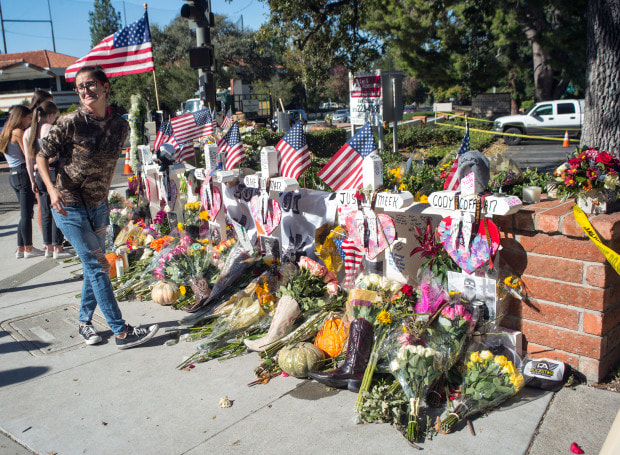|
So, it happened again. Another mass shooting in America. Where was it? Who did it? How many people died? Do I know anybody who died? When is this going to end? How do I assure my kids that they are safe to go to school and to the movies?
These are all valid questions that come up when shootings occur. Just recently in Thousand Oaks, California, at Borderline Bar and Grill 12 people were killed in a shooting. A Place that is supposed to be safe and fun for college students turned into a nightmare. Unfortunately, this is becoming the new norm and kids and parents alike are becoming habituated to these terrible tragedies. At the core of talking to a child, one question seems to come up the most, “Why do people want to hurt us?” Depending on the age of your child, the approach to talking to them varies. Witnessing coverage of mass shootings or any tragedy can cause psychological harm to younger children, specifically under the age of eight. This is because up to this age it is hard for children to differentiate between what is real and what is fantasy. Even kids older than eight can have negative psychological impacts of frequent exposure to violence portrayed on the news such as fear anxiety, anger, and depression. This is especially the case for highly graphic footage of violent acts. In fact, people believe that gaining the most information possible about an event helps them process and cope with it. This is not the case. The more adults and children alike expose themselves to violent footage of these mass shootings the less resilient, more stressed, and more terrified they actually become. Therefore, it is important to limit both you and your child’s exposure to gather the needed information to talk to your child about what happened. The next step is to allow a full expression of feelings for your child or adolescent. It is very common to want to tell our kids that “everything is going to be okay” and “don’t worry about it,” however; this does not promote a healthy expression of emotions. For younger children or adolescents who have trouble identifying their emotions it can be helpful to print out activities that name different emotions and can help than identify their emotions. In addition letting your children know that feeling any emotion is a completely normal reaction and that allowing themselves to fully experience and not distract from said emotions is important to allowing them to process what has happened. Another area of importance is to practice not placing blame in situations like these but focusing on common humanity. Letting your kids know that the majority of people want a community filled with peace, safety, and love can help bring stabilization to you and your child’s lives. With the common humanity comes the last portion of talking to your children about mass shootings: Channeling our feelings into positive action. It is healthy to channel all of our sadness, anger, frustration, and grief into setting up fundraisers for victim’s families, lobbying against gun violence, and also to model for your children that it is okay to take a day or two off from normal life to take care of themselves. This may look like going to the gym, treating themselves to their favorite food or dessert, or maybe spending some money on an item they really wanted. In addition going with your kids to events that endorse improving your community, whether it is related to gun violence or not, will empower both you and your child and is a positive outlet to channel emotions. Events can include fundraisers, blood drives, religious gatherings, and many other creative options that you and your child can help create. Utilizing all of these steps can help us talk to our children about gun violence after mass shootings. Using these techniques will not make things any easier to process, however, will help appropriately model how to deal with a flush of many different emotions at once and how we can deal and channel these emotions into doing good for ourselves and our community. Andrew Cohen is an AMFT who works as a case coordinator at Engage Therapy and a Therapist at Paradigm Malibu. He received his M.S in counseling psychology with an emphasis in marital and family therapy at California Lutheran University in 2018 and has grown up in the Thousand Oaks community his whole life. Andrew is passionate in working with OCD, Trauma, and a wide array of mental health and systemic issues. In his free time, Andrew enjoys spending time with his Fiancé and dog watching LA Kings games.
1 Comment
for sharing the article, and more importantly, your pers sdconal esdcx scperience mindfully using our emotions as data about our scinner state and knowing when it’s better to de-escalate by taking a time out are great tools. Appreciate you reading and sharing your story since I can certainly relate and I think others can to
Reply
Leave a Reply. |
Details
Archives
July 2023
AuthorWrite something about yourself. No need to be fancy, just an overview. Archives
July 2023
Categories |

 RSS Feed
RSS Feed